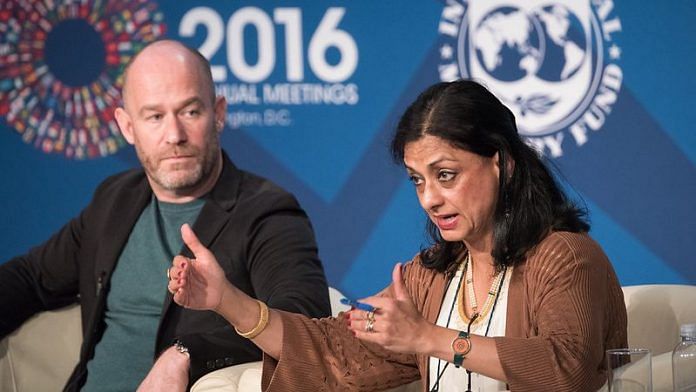New Delhi: The International Monetary Fund Wednesday announced that one of its noted Indian economists, Kalpana Kochhar, will be retiring next month to join the Bill and Melinda Gates Foundation (BMGF).
“In her 33 years at the Fund, Kalpana provided a shining example of strong leadership and dedication to the Fund’s mission,” IMF Managing Director Kristalina Georgieva said.
Kochhar, who spent over three decades holding various senior positions at the IMF including heading the Human Resources department, will leave the organisation on 30 July to serve as the Director of Development Policy and Finance at BMGF.
“After the IMF’s announcement, I’ve received a flood of emails from colleagues, with many saying they appreciated the honest advice I used to give them,” Kochhar told ThePrint.
When asked how she envisages her new role at BMGF, Kochhar explained that she will be heading the team that informs the foundation’s work through economic analysis, tracking emerging economic trends and advancing relationships with key economic policymakers.
“Since it’s a small team, a lot of the work will be carried out through partnerships with multilateral development banks and private think tanks. We’ll be providing grants to them,” she added.
Kochhar lives in Arlington, Virginia, with her husband, also an economist. She has two children, aged 27 and 29.
Also read: $50 billion — that’s how much world needs to finance to end Covid-19 pandemic
Dodging the medicine bullet
Born in the 1960s, Kochhar spent most of her early life in Chennai, though her family hails from Andhra Pradesh. Her father headed an engineering consultancy company while her mother was a homemaker. “I still have deep roots in Chennai and a family home there too,” she said, adding that her maiden name is Kappagantula.
When asked what inspired her to take up economics, she revealed: “My dream was actually to be a medical doctor. At the age of 16 or 17, I told my father I wanted to take up medicine but he warned me that it would mean studying for ten years. ‘Why don’t you consider going into economics? You’re good at maths,’ I remember him telling me. That was the best decision I ever made.”
She attended Good Shepherd Convent, an English-medium high school in Chennai, then went on to pursue a B.A. in Economics from Stella Maris College, Chennai, and an M.A. from Delhi School of Economics. She later obtained a PhD from Brown University, where she met her husband.
Before joining the IMF, Kochhar worked as an assistant professor at George Washington University for a year. “I had actually accepted the university’s offer before I got an offer from IMF, which I eventually deferred”, she said. “But I’m glad I spent that one year at the university. It’s only when you teach a subject do you truly understand it.”
Also read: Evidence of normalisation of India’s economic activity — IMF Chief Economist Gita Gopinath
Leading work on women & gender issues
Since joining the IMF in May 1988, Kochhar has held three senior leadership positions — deputy director of the Strategy, Policy and Review Department (2012-14), deputy director of the Asia and Pacific Department (2014-16) and director of the Human Resources Department (2016-2021).
“The highlights of my time at the IMF was working for my country,” Kochhar said. She recalled consulting the Indian government in drawing up the Fiscal Responsibility and Budget Management Act, 2003, and advising it during the aftermath of the 2008 global economic crisis.
In between her Fund positions, she served a two-year stint as Chief Economist for the South Asia region at the World Bank. There, she focused on trade and financial integration in South Asia and established a high-level advisory group of economists and foreign policy specialists from the region to assist the Bank.
While heading IMF’s Human Resources department, she led the work on women and gender issues which, according to her, “was not seen as a macroeconomic issue at the time”.
“I remember Christine Lagarde, the Managing Director at the time, saying, ‘I don’t know how empowering 50 per cent of the world’s population is not a macroeconomic issue’,” recalled Kochhar.
With Lagarde’s push, she and her team went on to build an analysis on women labour force participation, the constraints around it and what the fund could do about it. Their work culminated into a paper titled Women, Work & The Economy: Macroeconomic Gains From Gender Equity published by the IMF in September 2013.
As a working mother, Kochhar herself faced discrimination in the workplace. “When I was pregnant with my two children, there were comments about how committed I was to the job. But I only ever saw it as them throwing down the gauntlet.”
Also read: Targeted policies, managing debt, ‘green’ economies — Gita Gopinath’s Covid survival guide



